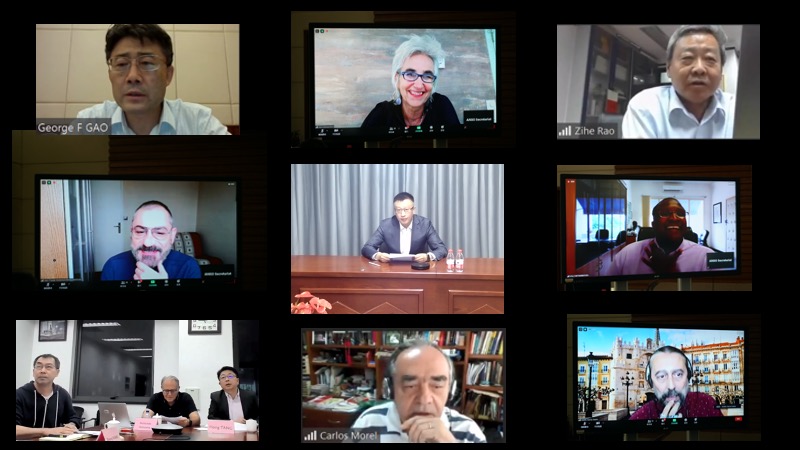The virtual International Symposium on “Lessons from and insights on COVID-19” ended with a big success in the late evening of 28 September 2020 in Beijing and Shanghai, having well achieved its objective as a scientific dialogue on what we have learnt from the pandemic, and how to develop better treatments and vaccines in the future. The meeting had the privilege of inviting 8 top level scientists from Asia, Europe, North America, Africa and Latin America. They all gave enlightening and inspiring scientific presentations. At the high point of the meeting, audiences from 25 countries in the world were listening online according to the records of the ANSO channel.
Prof. Qi Zhou, Deputy Secretary-General of the Chinese Academy of Sciences (CAS) gave a warm welcome on behalf of the organization, saying it was a wonderful meeting with the right topic at the right time. Taking the opportunity, he briefly elaborated the contributions that CAS and its institutes made in the joint fight against COVID-19. Some of the examples he cited include sequencing and sharing of the Database of 2019 Novel Coronavirus Resources, the development of the testing kits, neutralizing antibodies and vaccines and. He also mentioned the quick actions and response that ANSO took as an newly established international science organization in the joint combating such as the efforts in sharing the best Chinese practices in the prevention and control, genomic data, testing kits, and support and bridging of international cooperation in the research and development of diagnostic kits, drugs and vaccines with the ANSO members and partners.
Most of the speakers shared the experiences and lessons learnt from the COVID-19 pandemic of their own countries. Prof. George F. Gao, Director of China CDC (the Chinese Center for Disease Control and Prevention), speaking as a scientist, introduced the various quick actions that China took in the early analysis and control of the virus. He summed up the key experience and practices of Wuhan and China as the implementation of the “Four Lines, Four Levels and Four Earliers” approaches, which requires tremendous joint efforts from the national decision- makers to individuals on Communication, Cooperation and Coordination. He also cautioned the world and the society to be continuously on the alert. Dr. Amadour A Sall from the Institut Pasteur of Dakar (IPD) shared the pandemic situation and the lessons from Africa. He stressed the significant importance of the national leadership role in the prevention and control of the virus, praising his home country-- Senegal as a big success. In additional to the national leadership role, he emphasized the importance of decentralization of testing, coordination at community level and capacity building across the board. Prof. Carlos Morel from Fiocruz (the Oswaldo Cruz Foundation) blamed the sever COVID-19 situation in Brazil as a result of lack of the national leadership, appropriate policy and attitude and vulnerable public health system. “Brazil faces a political, economic and social crisis”, he said. Prof. Morel called for enhanced international cooperation and joint development of vaccines to fight against the pandemic in Latin America and the whole world.
Prof. Marion Koopmans, Director of the WHO collaborating centre at Erasmus, and Prof. Jean-Claude Manuguerra from the Institut Pasteur of France, both shared their latest research on different modes of virus transmission, which helps the public to understand the spread patterns, lifetime and evolution of the virus. Prof. Zihe Rao from Tsinghua University/China, Prof. Zhong Huang from IPS/CAS, and Prof. Adolfo García-Sastre from the Institute of Icahn School of Medicine/US, shared their latest research results and scientific insights on the development of drugs against COVID-19. Prof. Rao’s team has made major breakthroughs in fundamental research based on 17 years accumulated efforts, laying solid foundation for the R&D of drugs for the treatment of COVID-19. It is interesting to note the drug development approach taken by Prof. Adolfo García-Sastre, who has analyzed hundreds of existing drugs and tried to find the ones that can cure the current pandemic.
Throughout the presentations and discussion of the symposium, the solidarity and cooperation of global scientific community were emphasized as the key to win the battle against the pandemic. As it is pointed out on many occasions: “We have one world and one health, the destinies of all nations are closely connected. Fighting together is the only way to get us out of crisis."
This symposium was co-organized by the Institut Pasteur of Shanghai (IPS), CAS and the Alliance of International Science Organizations (ANSO). It was hosted by Prof. Jinghua Cao, Executive Director of the ANSO Secretariat, and moderated by Prof. Hong Tang, Director General of IPS/CAS, and Prof. Fernando Arenzana-Seisdedos, Scientific Co-Director of IPS/CAS.


